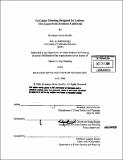La Casita -- housing designed for Latinos : two cases from Southern California
Author(s)
Murillo, Brittanya Alicia
DownloadFull printable version (10.20Mb)
Alternative title
Housing designed for Latinos : two cases from Southern California
Other Contributors
Massachusetts Institute of Technology. Dept. of Urban Studies and Planning.
Advisor
Xavier de Souza Briggs.
Terms of use
Metadata
Show full item recordAbstract
As the nation's fastest growing minority group, Latinos are expected to be the main engine of household growth over the next decade. This demographic trend is most apparent in Southern California. While much attention has been paid to making homeownership more accessible to Latinos, no serious considerations have been given as to how or if the housing product should be adapted. I contend that because Latinos have distinct household formation and commuting patterns, the preferences for the housing they occupy are also different. This thesis investigated how home builders have responded to the Latino consumer. I found that the innovators of culturally competent housing for Latinos were non-profit developers. These organizations were best suited to understand their Latino client population and so the housing they developed took into account more than the provision of shelter; they considered supportive services, culturally-specific uses of space, and a Latino aesthetic. Because they were driven by motivation other than profit, these developers- New Economics for Women and Casa Familiar- have proven t be more innovative than private developers. (cont.) They have met the ethno-specific needs of Latino consumers of housing, through the use of "Latino Housing Design" methods. I examined the role of the public, private and non-profit sector to determine how they each enabled or hindered the development of culturally competent housing. Recommendations were offered to streamline the development of Latino Housing Design-type products.
Description
Thesis (M.C.P.)--Massachusetts Institute of Technology, Dept. of Urban Studies and Planning, 2006. Includes bibliographical references (p. 44-46).
Date issued
2006Department
Massachusetts Institute of Technology. Department of Urban Studies and PlanningPublisher
Massachusetts Institute of Technology
Keywords
Urban Studies and Planning.